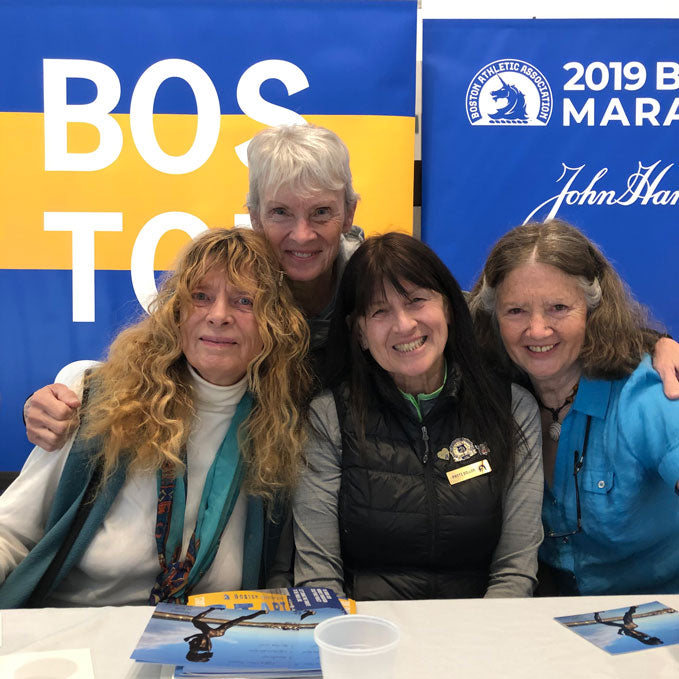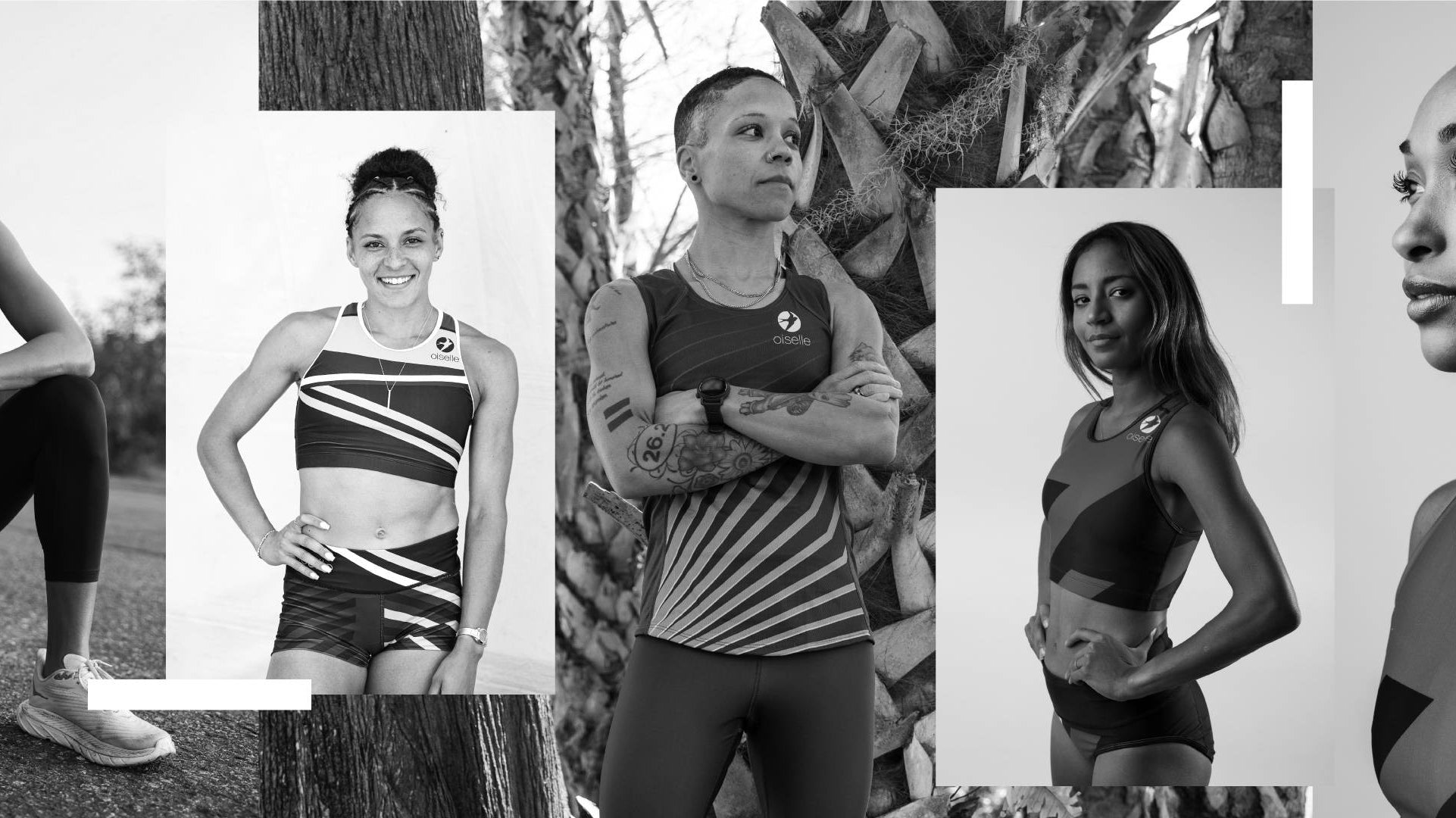
Every year that I go to Boston around marathon time, I appreciate it more. The Volée team events, spectating the marathon (cry-fest), all of it. This year, I attended two exceptional female-focused gatherings. The first was well-publicized, videotaped in a theater, and deservedly sold out at $15/ ticket; the second was free and perhaps 2/3 of an expo convention room full (and I sincerely hope that it was also video recorded)!

Lindsay Crouse of the NYT put together a stellar group of our current running stars 2 days before the marathon (Saturday at 3pm): Tatyana McFadden (2ndat Boston), Shalane Flanagan, Desi Linden (5that Boston), Sara Hall, Lindsay Flanagan (9that Boston), Sarah Crouch, Sarah Sellars, and Jordan Hasay (3rdat Boston). In her intro, Lindsay quoted this stat: only 4% of sports coverage is about women. What?!? [At Oiselle, we steep ourselves in women athletes and women’s sports coverage, so that statistic seems incomprehensible. But believable at the same time.] Lindsay C. and the NYT took advantage of the weekend to bring all of these women together to converse. (I believe, sparked by this great article by Lindsay C. after Shalane won the NY Marathon in 2017, which coined the “Shalane Effect” for Shalane lifting teammates as she herself succeeded.) Cool, right? So many gold nuggets (and the NYT will put out a video soon for others to watch), but just a few of my takeaways:
Shalane - explained how seeing teammates achieve makes you believe you can do it too…she was disappointed with the results of the Rio Olympics, saw Amy win the bronze at Worlds in London, won New York herself and passed the baton off to Desi. Success breeds success.
Tatyana – talked about her transition from track racing (literally, sprints) to marathons over the course of less than a year. Talk about range and a flexible attitude!
Desi Linden – shared that one of her superpowers is that she is comfortable in her own skin. To illustrate her comfort, she shared a story from lunch that day when she’d noticed she had a swelling behind her right knee, felt it, and realized it was just some bunched up underwear. Classic.
It was at least an hour convo, and there was so much more goodness in there (audio here). It’s worth a NYT subscription. And a big thank you to Lindsay Crouse for gathering all of these current superstars on the same stage for an elevating conversation. So important.

The second women’s panel was on Sunday, 4pm at the expo, titled “Pioneers of Women’s Running.” It featured four women with New England or Boston ties who, through their bravery, love of running, and willingness to break rules, carved the way for all female runners today. Bobbi Gibb (first woman to run the Boston Marathon in 1967 in 3:19), Patti Catalano (first American woman under 2:30 in the marathon, first Indigenous woman under 2:30), Julia Chase-Brand (first woman to run the Manchester Road Race), and Cheryl Treworgy (world record holder in the women’s marathon 1971 2:49, also Shalane’s mom!) made up the panel. I felt like an excited school-girl going to this talk. I brought Amby Burfoot’s book with me, pages ear-marked to our speakers, and showed people around me their race pictures as they spoke. Adrianne Haslet was the moderator—she and Bobbi had competed in a marathon trip to the UK in prior years which may have been the spark for the talk. Really, this 60 minutes blew my mind. Women’s running history is SO NEW, none of their experiences were very long ago! When I was running in college in the late 80's, their experiences were recent events. I will try to link a video of this talk if I can find it; you should watch it. Just a few highlights:

Julia Chase-Brand held up her “racing kit” from the Manchester race: a denim dress over blouse. Her bra wasn’t very comfortable so she shoved it in her coach’s pocket before the race started and told him “don’t look”.
Cheryl was frustrated by the lack of running bras for women, so she started designing them herself, sewed prototypes, tested the designs on hundreds of women, filed patents, and still owns these bra patents to this day! (Spoiler alert, you may be hearing more about this in the future).
Bobbi was a free spirit who loved to connect to nature by running. She ran long runs of over 40 miles at one go, so when her application to Boston was rejected because “women weren’t physiologically capable of running that distance” she knew that was wrong. So naturally she had to take a 3 day bus trip from CA and run the marathon in a swimsuit and Bermuda shorts to prove the point.
Patti Catalano started running to lose weight but running made her feel so good she was immediately hooked. 7 months after she started running, she ran her first marathon (in 2:53!). She hadn’t yet given up smoking…she said that cigarette after her first marathon tasted so good.

Each of these women shared common lessons: running had shown them how powerful they were, a knowledge that carried through their future life endeavors. They understood at a fundamental level that rules can be arbitrary and based on ignorance; that traditions can be a lazy way to keep power structures in place. [One of the Boston Marathon’s official reasons for not allowing women to race was that the AAU had accredited the race as an all-male event, so they would lose their accreditation if they allowed women. Does anyone recognize this inability to accept responsibility in our current sports bodies?]
As I listened to these pioneers, I reflected on the previous day’s talk as well, and the excitement generated by the current stars. Maybe it is telling of my age (almost 50), but I was captivated at least as much by the Pioneers. And then I had a thought…what about bringing these groups of women together for a moderated Pioneers and Stars panel in Atlanta for the Olympic Trials? After all, it is one short line from Bobbi to Desi, from Cheryl to Shalane (that’s an even shorter line!), from Julia to Jordan. And the common theme amongst all of these women (and the audience as well), is that they just love the way that running makes them feel. Thank you, running!












